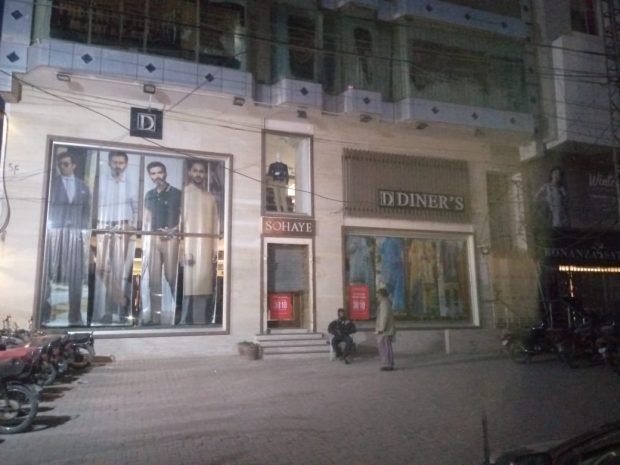Second wave of Covid-19 grips Pakistan

Notice for a shop sealed for violating SOPs (Picture by Information Department, Government of Sindh)
By Nasir Aijaz
The AsiaN Representative
Islamabad: The second wave of novel coronavirus has gripped Pakistan, compelling the government to again close down the educational institutions, impose a ban on visiting the shrines, curtail the business timings and strike ‘smart lockdown’ in specific areas identified as hubs of the pandemic.
Pakistan recorded the highest single-day spike of 3,009 coronavirus cases in over four months on November 25, taking the cumulative tally to 382,892. The tally rose to 386,198 on November 26 after 3,306 new cases were detected in the past 24 hours across the country.
The province-wise breakup of the total number of cases on the morning of November 26 is as follows:
Total confirmed cases: 386,198
- Sindh: 167,381
- Punjab: 116,506
- Khyber Pakhtunkhwa: 45,828
- Balochistan: 16,942
- Islamabad Capital Territory: 28,555
- Gilgit-Baltistan: 4,583
- Azad Jammu & Kashmir (AJK): 6,403
Total Deaths: 7,843
- Khyber Pakhtunkhwa: 1,344
- Punjab: 2,923
- Sindh: 2,866
- Balochistan: 165
- Gilgit-Baltistan: 96
- Islamabad Capital Territory: 297
- AJK: 152

Shop sealed for violating SOPs (Picture by Information Department, Government of Sindh)
According to the National Command and Operations Centre (NCOC), the virus claimed 59 lives across the country in the past 24 hours.
With the COVID-19 pandemic progressively getting worse in Pakistan, the government has placed fresh restrictions across the country to prevent the spread of the virus during its second wave.
Following the recommendations by the NCOC, the government has made face masks mandatory in public spaces, limited large public gatherings to 300, banned indoor weddings, closed shrines, cinemas, and theatres, and instructed public and private offices to adopt work-from-home policy and 50% occupancy.
The federal government also announced that educational institutes will remain closed from November 26 to January 10. The students will study at home or get weekly homework till December 24 and winter vacations will start December 25. The schools will reopen on January 11 – which is subject to coronavirus situation then.

Raid to seal shop for violating SOPs (Picture by Information Department, Government of Sindh)
All examinations have been postponed except admission and recruitment tests.
In Islamabad, apart from the government’s COVID-19 policies, the local administration has directed the hostels to accommodate one-third of the usual number of students.
The Punjab provincial government has adopted smart lockdowns in at least six cities so far. All shopping malls, restaurants, offices remain closed under the lockdown.
All large gatherings have been banned while milk and meat shops have been allowed to operate from 7:00am to 7:00pm while grocery and general stores, flour mills, fruit and vegetable shops, tandoors (Bread-making shops) and petrol pumps’ timing are set to 9:00am to 7:00pm.
In Sindh, the provincial government has allowed markets and business centers to operate from 6:00am to 6:00pm on weekdays but directed them to stay shut on weekends. Only essential services will stay open on weekends.

Shop raided for violating SOPs (Picture by Information Department, Government of Sindh)
Indoor events have been banned while outdoor events are limited to 200 guests. At weddings, closed-door marquees and buffets have been banned while food is to be served in packets and the function has to end by 9pm.
All cinemas, shrines, theatres, and gym will stay closed.
In Karachi, the provincial capital, indoor dining has been but banned however restaurants have been allowed to provide dine-in facilities in open spaces. Delivery is allowed beyond 10:00pm as well.
The province has adopted the NCOC policy on education, offices, and face masks.
Balochistan’s provincial education department announced early and extended winter vacations last week. Educational institutes will remain closed from December to February.
Khyber Pakhtunkhwa provincial government has banned indoor weddings and limited outdoor gatherings to 300 guests. All shopping malls, markets, restaurants, and wedding halls have been directed to shut by 10:00pm. Public parks and recreational spots will close by 6:00pm.
Essential services, pharmacies, tandoor shops, and petrol pumps will remain open 24/7
Azad Jammu and Kashmir regional government had imposed a 15-day lockdown on November 20 under which all public gatherings have been banned. All businesses and offices are closed while the government offices will operate at 50% capacity. Only essential services are allowed with strict implementation of coronavirus SOPs.
The government has closed down schools. It is also requesting locals and Kashmiris based abroad to avoid travel.

Shop sealed for violating SOPs (Picture by Information Department, Government of Sindh)
Unfortunately, despite such a grave situation, most of the traders and general public do not observe the SOPs and avoid wearing face masks. As a result the provincial governments have started sealing the shops, restaurants and shopping malls found violating the SOPS.
The provincial government of Sindh on November 26, under the pressure of associations of traders, extended the business timings for two hours allowing the traders to keep markets opened till 8p.m. онлайн займ список

























































